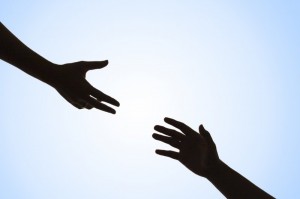There are times when we all struggle with what to say and how to say it.
Cancer is a word that strikes deep fear in all of our hearts, and finding out a close friend or family member – or even an acquaintance – has been diagnosed can leave many feeling awkward and unsure.
Many people are afraid to ask questions, afraid to come around.
I remember, after Joe was diagnosed with Non–Hodgkin’s lymphoma, we had very close friends who never called or came by. To this day I have no idea why; maybe they simply didn’t want to intrude.
But those diagnosed with cancer don’t want to be isolated, nor do their families. As someone who’s been through the terrible ordeal of a cancer diagnosis, and the panicky scramble to immediately find and start treatment, I know I very much appreciated everyone who reached out to our family during this time.
If you don’t feel comfortable calling, send a text, email or Facebook message. Or better yet, mail an old-fashioned card. Written, sentimental statements are not a thing of the past. They are very special. I still have the box of cards I received when Joe was ill, the box I used to take with me to the hospital to re-read during his treatments. They gave me immense strength and comfort.
Let the person with cancer and their family members be your guides, as to what they need and want. Use good judgment about what to say and not say. Put yourself in their shoes.
Here are a few questions to avoid:
· “Oh my God, so how many tumors do you actually have in your body?”
· And, “What stage are you?”
And don’t call cancer patients and their close family members crying! That’s the worst. When Joe was sick, I didn’t want to hear anyone cry. I wanted to cry and I was trying to stay strong. So, remember to not be more emotional than the family member; we’re glad to know you care, but crying really doesn’t help.
If you want to help in a very tangible way, organize friends, family and neighbors to complete functional tasks for the family: cook meals, care for children, grocery shop, provide rides, help with housework or mow the lawn.
There are now great organizations that assist friends, family and volunteers in creating helping networks for caregivers and patients, such Neighbor Brigade and Lotsa Helping Hands. These groups help everyone in a patient or caregiver’s circle mobilize and organize through online calendars and task lists that allow helpers to quickly see what’s needed. Everyone can track who’s covering which tasks, so there’s no duplication and confusion. And patients and families can “ask” for help online through quick and easy requests, avoiding time-consuming, tiring and potentially embarrassing phone calls.
The value of help with the mundane tasks of everyday family life when you’re battling cancer is immeasurable. I was so grateful when – after we returned to the Boston area, after years away – people just took care of us.
If the family dealing with illness has kids, taking them out for activities and play dates is also really appreciated, as parents may not have time, energy and money for fun during treatment.
I know one thing I really needed to do, personally, was talk. I would go into the shower and cry, and I would have loved it if someone had just been able to shake me and say, “Jen, just talk!”
My best friends were far away during Joe’s treatment, and I really craved people to vent with. Simply inviting the patient or caregiver to talk – maybe over a glass of wine – could be just what’s needed.
Ultimately, just be a friend, be sensitive, try to be useful and take your cues from your friend or loved one. They are dealing with so much, too much – an immense emotional, physical and financial challenge. The fight of their life.
Know that every kindness is deeply appreciated.
– Jen Andruzzi


